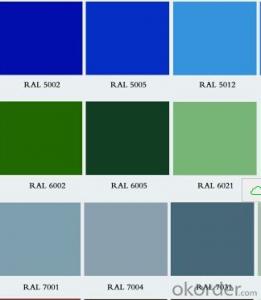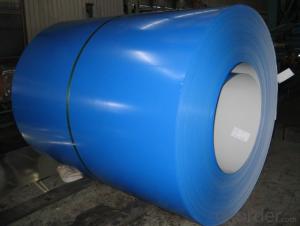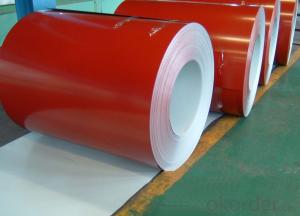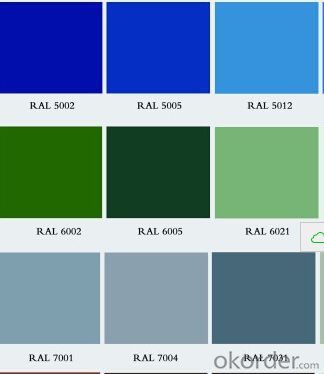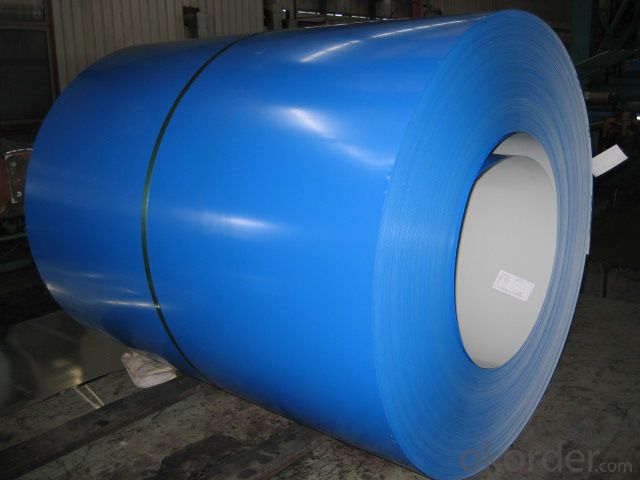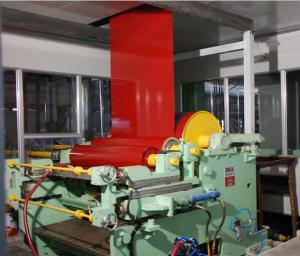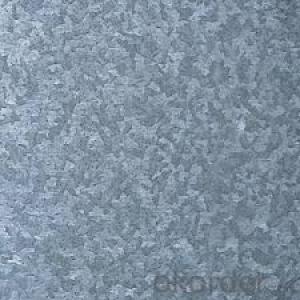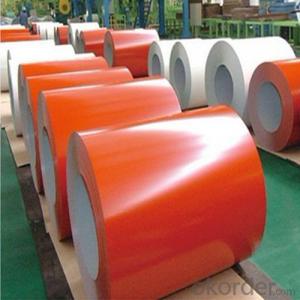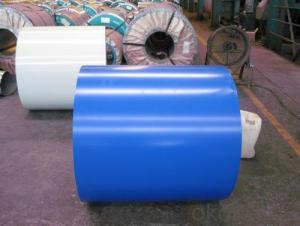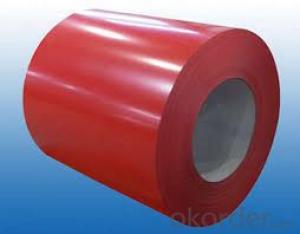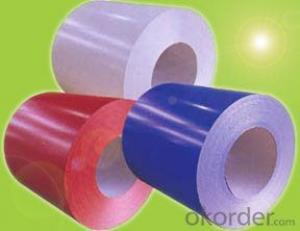Prepainted Steel Coil/Sheet
- Loading Port:
- China Main Port
- Payment Terms:
- TT OR LC
- Min Order Qty:
- -
- Supply Capability:
- -
OKorder Service Pledge
OKorder Financial Service
You Might Also Like
Product Features
super weather resistance and durability , also the pattern is capable to bring about plenty of effects of multilayer, parallax and 3D effect.
Application
It is the perfect building material in construction for making steel roofing/suspended ceiling, office partition, Sandwich panel, insulation panel, corrugate sheet, facade wall,rolling doors, T-bar, garage door and shutters etc.
Structure of Cross-section
Items | Thickness | Type | Features |
Protection Film | 50μm | polyethylene | Protecting from scratches and |
Finished Coat | 10μm | PVDF | Protecting printed layer and enhances |
Print | ≦1μm | Ink, Polyester | Various printing patterns,3 colors overprint |
Top Coat | 20μm | Polyester Fluorine | Chemical resistance, formability and |
Primer Coat | 5μm | Polyester | workability, corrosion resistance and |
Chemical Treatment | ≦1μm | Chromate | Good adhesion and corrosion resistance |
Substrate | 0.2-1.2mm | GI.GL.AL | GI.GL,AL |
Chemical Treatment | ≦1μm | Chromate | Good adhesion and corrosion resistance |
Back Coat | 5μm | Epoxy | corrosion resistance and adhesion to the |
- Q: What are the dimensions of steel coils used in the metal furniture industry?
- The dimensions of steel coils used in the metal furniture industry can vary depending on the specific application and requirements. However, common dimensions for steel coils used in this industry range from 0.5mm to 3mm in thickness and 600mm to 2000mm in width.
- Q: How are steel coils used in the production of packaging machinery?
- Steel coils are used in the production of packaging machinery to create various components such as frames, supports, and structural parts. These coils are shaped, cut, and formed into specific designs to provide strength, durability, and stability to the machinery. Additionally, steel coils can be used to fabricate conveyor belts, rollers, and other moving parts, ensuring smooth operation and efficient packaging processes.
- Q: My neighbor who has an older model mustang installed a steel clutch in it and has blown 4 transmissions as a result.Can any mechanic explain why a steel clutch would kill transmissions? What other modifications would the car need in order to prevent this?
- figger he would learn after a tranny or two...no reasion for any clutch to wreck a tranny.must b bad instalation..or he cant drive
- Q: How are steel coils used in the production of oil and gas pipelines?
- Steel coils are used in the production of oil and gas pipelines as they provide the necessary strength and durability required for transporting petroleum products over long distances. These coils are formed into pipes through various manufacturing processes, such as hot rolling or cold forming, and then welded together to create a continuous pipeline. The high tensile strength of steel coils ensures that the pipelines can withstand the high pressure and harsh environmental conditions associated with oil and gas transportation.
- Q: is a 1962 steel penny worth anything?
- Don't know that they're worth a whole lot at this time, but hold on to them. They may be at some point, and what's the loss if you keep them? May be worth something to the kids or grandkids?
- Q: What are the common coil lengths available for steel coils?
- The common coil lengths available for steel coils vary depending on the industry and specific requirements. However, some standard coil lengths are commonly used across various applications. These include coil lengths of 100 feet (30.48 meters), 200 feet (60.96 meters), 300 feet (91.44 meters), and 500 feet (152.4 meters). These lengths are often used in industries such as construction, manufacturing, and automotive, where steel coils are widely used for various purposes. It is important to note that coil lengths can also be customized based on specific project needs or customer preferences.
- Q: So, I'm doing this project for my chemistry class and I need to explain the raw materials in which paper slips are made of. I'm not really sure if galvanized steel is. If not, can someone PLEASE tell me what raw materials are metal paper clips made of???
- For paperclips, the raw material is steel wire. The company that makes paperclips does not smelt iron, they buy the steel wire at the diameter they want it and they feed it into automated machines that bend the wire and cut it to length. If you want to go back into the whole supply chain, then you are looking at a mine that digs iron ore from the ground. The iron ore (Taconite is one of the minerals but there are others) is sent to a smelter that combines the ore with coke (roasted coal) and oxygen in a huge furnace. They may probably add steel scrap, and continuously cast it into bar. good luck
- Q: How are steel coils tested for strength and durability?
- Steel coils are tested for strength and durability through various methods such as tensile testing, impact testing, and fatigue testing. Tensile testing involves subjecting the steel coil to tension until it breaks, measuring the maximum force it can withstand. Impact testing involves striking the coil with a heavy object to assess its ability to resist sudden shocks. Fatigue testing involves subjecting the coil to repeated load cycles to determine its resistance to long-term stress. These tests help ensure that steel coils meet the required strength and durability standards.
- Q: Can steel coils be custom-made to specific requirements?
- Yes, steel coils can be custom-made to specific requirements. Steel manufacturers have the capabilities to produce steel coils with various dimensions, thicknesses, and specifications to meet the specific needs of customers. These coils can be customized in terms of width, length, weight, and even surface finish to suit specific applications and industries. Customization can also include variations in steel grade, coating type, and mechanical properties to ensure the desired performance and functionality. The ability to tailor steel coils to specific requirements allows for optimal utilization in various sectors such as automotive, construction, appliances, and manufacturing, among others.
- Q: No. Not Stainless steel, I mean STEEL.Not a specific type, but STEEL.Thanks. xo
- This Site Might Help You. RE: Is Steel a Pure Substance or a Mixture? No. Not Stainless steel, I mean STEEL. Not a specific type, but STEEL. Thanks. xo
Send your message to us
Prepainted Steel Coil/Sheet
- Loading Port:
- China Main Port
- Payment Terms:
- TT OR LC
- Min Order Qty:
- -
- Supply Capability:
- -
OKorder Service Pledge
OKorder Financial Service
Similar products
Hot products
Hot Searches
Related keywords
